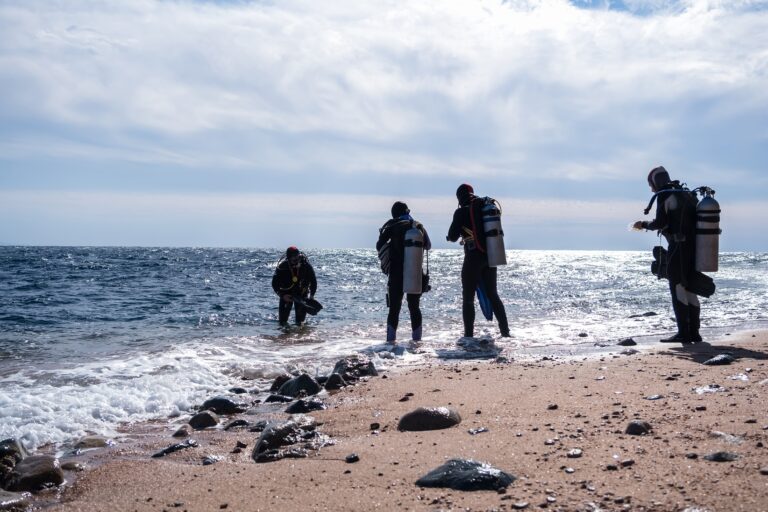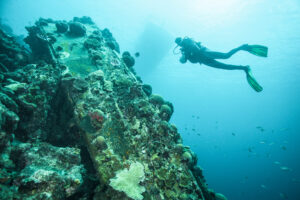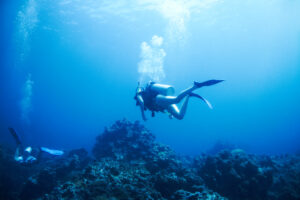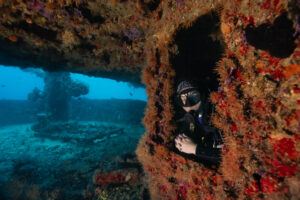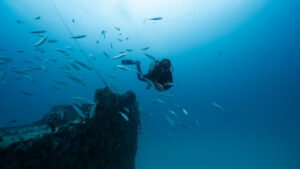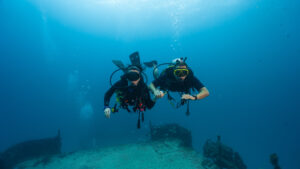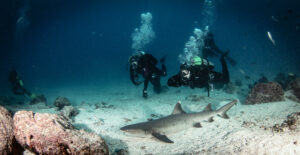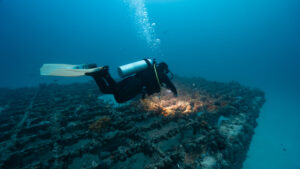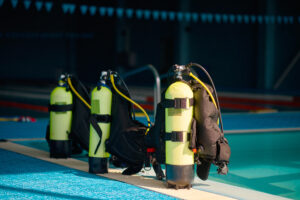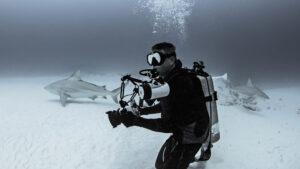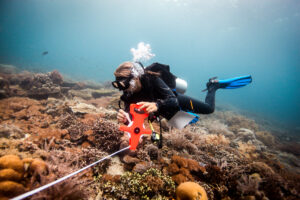What is Beach Diving?
Beach diving refers to a distinct form of scuba diving where participants initiate their underwater journey by entering the water directly from a shoreline or beach rather than from a boat or other watercraft. Often called “shore diving” in some regions, it offers divers unique experiences and challenges that differ from boat diving.
Historical Context
The practice of beach diving has roots tracing back to the earliest days of scuba diving. Before the proliferation of dive boats and organized dive charters, many early divers would simply venture into the waters directly from the shore. This method offered ease, accessibility, and was cost-effective, especially in regions where the marine biodiversity was within a stone’s throw from the shoreline.
Advantages of Beach Diving
Scuba diving offers enthusiasts a myriad of choices when it comes to embarking on underwater adventures. While boat diving has its own charm, many divers are turning towards the beaches for a refreshing change. Beach diving, often affectionately referred to as “shore diving,” boasts several distinct advantages that beckon divers of all skill levels. Here, we delve into the primary benefits that give beach diving its undeniable allure.
Unparalleled Accessibility
One of the foremost attractions of beach diving is the unparalleled ease of access it offers. Many diving enthusiasts reside in regions where boat diving operations might not be as prevalent or where the seascape’s hidden treasures are but a few meters away from the shoreline. Beach diving obviates the need for extensive planning or waiting for favorable boat schedules. Simply strap on your gear, step off the sandy or rocky shores, and plunge into the marine world waiting to be explored.
The Economical Choice
Diving can sometimes become an expensive hobby, especially when considering the cumulative costs of multiple boat dives. Beach diving, however, levels the playing field. By eliminating the need to charter a boat or join a boat dive group, divers can often enjoy the marine world without burning a hole in their pockets. For residents near coastal areas with abundant marine life, the economic benefits become even more pronounced. It’s about experiencing the wonders of the ocean without the added overhead costs.
Dive On Your Own Terms
Beach diving is synonymous with flexibility. Divers are not tied down to the rigid schedules of boat dives or the set paths that such group dives often entail. Instead, divers can choose their own adventure. From selecting the perfect entry and exit points to deciding how long and deep they wish to dive, beach diving offers an element of freedom that’s hard to match. It’s about taking control of one’s diving experience, adjusting plans on-the-go, and truly connecting with the ocean at one’s own pace.
A Gentle Introduction for Novices
For those just getting their feet wet in the world of scuba diving, beach diving can serve as a gentle introduction. The absence of the sometimes daunting process of diving off a boat, coupled with the familiarity of the beach setting, can make the initial plunge less intimidating. Beach dives often start in shallower waters, allowing beginners to gradually acclimate to the underwater environment. Moreover, practicing skills like buoyancy control or navigation becomes simpler when one isn’t immediately plunged into the deeper realms. It’s an environment that fosters learning, allowing novices to grasp the basics of diving in a controlled and reassuring setting.
Challenges and Considerations
Beach diving, with its inherent allure of entering the undersea realm straight from the coastline, undeniably offers unique experiences. However, this mode of diving is not without its set of challenges. From understanding the whims of the sea to ensuring proper equipment handling, beach divers must be prepared to address various considerations. Let’s delve deeper into these challenges and provide insights for a safe and enjoyable beach diving experience.
Entry & Exit: The Dance with Nature’s Forces
The very first, and perhaps the most immediately noticeable challenge of beach diving, is the act of entering and exiting the water. Unlike the relatively stable platforms provided by boats, the shoreline is dynamic. Beach divers must navigate through breaking waves, which can be powerful and unpredictable, especially in surf zones.
Further complicating matters, the seabed near the shore might be rocky, slippery, or uneven. It’s not uncommon for divers to find themselves struggling to maintain footing, especially when wearing fins and carrying equipment. Stumbles can result in injuries or damage to equipment.
Understanding the tidal, wave, and current conditions is paramount. Divers should familiarize themselves with local tide charts, recognizing that entry during low tide might expose rocky terrains hidden during high tide. Additionally, knowing when to time the dive with the slack tide can mitigate strong currents.
Longer Swims: The Journey to the Dive Site
While some beach dive sites are located conveniently close to the shore, others require divers to swim a significant distance to reach the main attraction. This not only tests one’s stamina but also consumes air, potentially shortening the actual dive time at the desired location.
Divers should be physically prepared for the exertion and should also have navigational tools like compasses or surface marker buoys. It’s crucial to plan the dive, considering the swim distance, current conditions, and air consumption.
Equipment Handling: Managing Without the Boat’s Conveniences
Dive boats often come equipped with storage bins, tank racks, and prep stations – luxuries that a beach doesn’t offer. At the shore, divers must manage their gear effectively. This includes assembling and disassembling the gear on sand or pebbles, which can introduce debris into sensitive equipment.
Transporting gear from a car park or drop-off point to the dive site can be cumbersome. Dive carts or wagons can assist in this, but divers should be prepared for some degree of manual gear hauling. It’s also essential to secure belongings from potential theft if left unattended on the beach.
Safety Precautions: Navigating Local Hazards
Beyond the typical safety protocols, beach diving introduces specific challenges. Rip currents, which are powerful, fast-moving channels of water moving out to sea, can pose a significant risk. Divers should be educated on identifying and escaping rip currents.
Shifting sands can change the underwater landscape, introducing unexpected drop-offs or obstacles. Additionally, beach divers might encounter surfers, swimmers, or fishermen. Effective communication and awareness of other water users are crucial to prevent accidents or disruptions.
Tips for a Successful Beach Dive
The allure of beach diving is hard to resist. The freedom of stepping into the surf and diving into an underwater world without the need for a boat is a dream many scuba enthusiasts chase. However, as with all diving, preparation is key. Here’s an in-depth look at some essential tips for ensuring a safe and enjoyable beach dive.
Research: Dive Into Knowledge
Before you immerse yourself in the ocean’s depths, take a deep dive into knowledge. Familiarize yourself with the specific dive site’s topography. This means understanding the layout of the underwater terrain, which can significantly impact your dive’s safety and enjoyment. For instance:
- Are there any underwater caverns or overhangs?
- Is the bottom sandy, rocky, or covered in coral?
By knowing these details, you’ll be better prepared to navigate the underwater landscape and avoid potential hazards. Additionally, find out the best entry and exit points for that particular location, ensuring a smoother dive experience.
Check Conditions: Mother Nature’s Mood Matters
Mother Nature is unpredictable, and her moods can influence your dive. Before setting out, monitor the weather conditions. A sudden storm can impact visibility underwater and make exit and entry challenging due to strong surf. Also, always keep an eye on:
- Tide conditions: Tides can affect underwater currents, visibility, and even which marine life you might encounter.
- Surf conditions: Strong waves can make it challenging to get beyond the break and can stir up the bottom, reducing visibility.
Stay Hydrated: Dive In, But Drink Up!
The salty sea air, combined with the exertion of carrying equipment across the beach, can quickly lead to dehydration. It’s crucial to:
- Drink plenty of water before and after your dive.
- Recognize the signs of dehydration which can include dizziness, dry mouth, and increased thirst.
- Take breaks as needed. Remember, diving should be enjoyable, not an endurance test.
Buddy System: Two Divers Are Better Than One
The “buddy system” is a cornerstone of safe diving practices. When beach diving:
- Ensure that both you and your buddy are familiar with the site and have agreed on a dive plan.
- Establish clear communication signals for underwater.
- Set a time and depth limit for your dive.
- In case of unforeseen circumstances or emergencies, having a buddy can be a lifesaver.
Local Knowledge: Tap Into the Expertise Around You
Local dive shops and clubs are invaluable reservoirs of information. These experts have likely dived the site numerous times and can offer:
- Insights into the best times to dive.
- Updates on recent changes, such as shifting sands or newly discovered underwater features.
- Sightings of marine life that may be in the area.
- Recommendations for other dive sites in the vicinity that might be of interest.
By tapping into this local knowledge, you can enrich your diving experience and ensure a safer underwater adventure.
Beach diving provides a unique and intimate experience for scuba divers, blending the terrestrial beauty of shorelines with the underwater wonders just beyond the waves. By respecting local conditions and being well-prepared, divers can immerse themselves in memorable beach dives, exploring marine realms directly from the coast.

